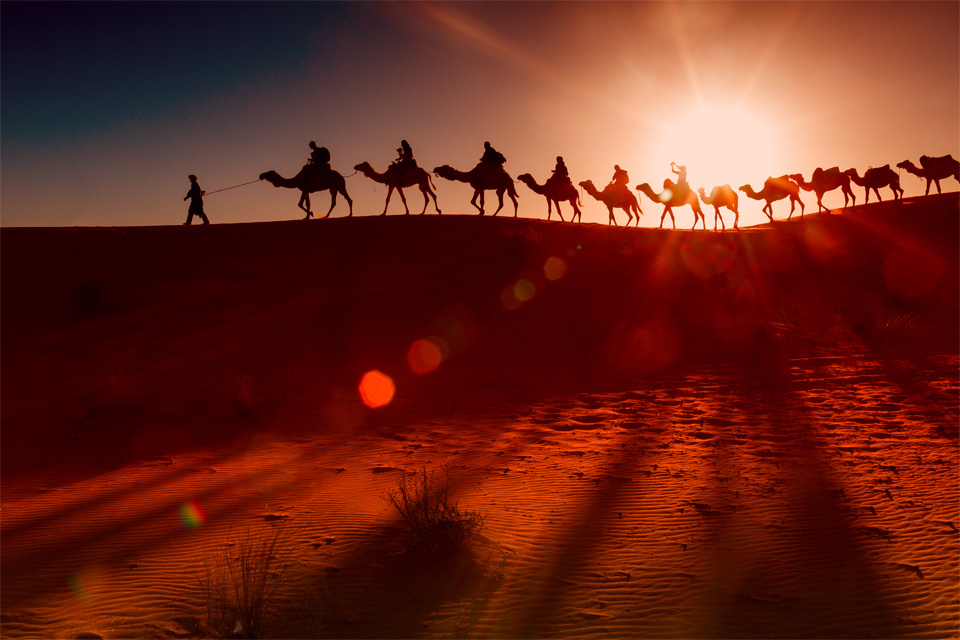Source: Real & Wonderful Stories, compiled by: Abdurahim bin Mizhir Almalki
What’s so special about the first 10 days of Dhul Hijjah?
In Islam, as we are prescribed from Allah Himself, there are twelve months to the calendar year. Of these twelve months, the month of Dhul Hijjah marks the last month of the year.
It is special in that as its position as the last month of the Islamic year, we become thankful in remembrance of that year and the passage of yet another year in our lives, and hopeful for the year to come that Allah will bless us with more life to worship Him and attempt to gain more reward and forgiveness from Him. It is the month in which is the Day of Arafat and the Day of the Sacrifice (Eid al-Adha).
The Day of Arafat
The 9th day of Dhul Hijjah is highly important as perhaps the most important and valuable day of the year – as this is the Day of Arafat.
The Day of Arafat is the day that the pilgrims stand at the mount (and surrounding region) of Arafat until sunset, seeking Allah’s forgiveness. It is the main pillar of the pilgrimage (haj) – as if the pilgrim is not present at that spot on that day during the time prescribed, then regardless of his or her attendance to the other rites and rituals of the haj – then it is not written for him to have performed the haj.
It was during the Prophet’s last haj (hajjut-al-wida’), as he was present there at Arafat, on the Day of Arafat, that the following verse was revealed and he recited it to his companions:
“This day I have perfected for you your religion and completed My favour upon you and have approved for you Islam as religion.” (Qur’an 5:3)
Similar in that Laylatul Qadr during the blessed month of Ramadan is considered as the greatest night of the year, with promise of the greatest reward for worship during that night, the Day of Arafat is considered as the greatest day of the year, with promise of the greatest reward or worship during that day.
It was this day, ages ago, the Day of Arafat, that Allah (SWT) perfected His religion, completed His favours upon His beloved Prophet Mohammed (PBUH), and approved for us all Islam as a way of life.
The best form of worship one can observe for this day is to perform the haj, and be present at Arafat on the Day of Arafat, during the prescribed time period (i.e. to present at Arafat sometime after sunrise on the Day of Arafat, and remain there until the sun sets, not to exit the area until after the maghreb time commences).
If this is not possible for the Muslim, then other forms of worship are suggested – most foremost of which is fasting on this day – as it is foretold for us that fasting on this Day of Arafat is an expiation of sins from the previous year and the next year combined.
The next form of worship is of course increased remembrance of Allah and exclaiming His praise and thanks, and seeking forgiveness. Keep your tongue moist always with phrases and words of remembrance, praise and seeking forgiveness. And of course, reciting Quran and prayers.
The Day of Sacrifice
The tenth day (the day that follows the Day of Arafat) is the Day of the Great Sacrifice – the day of Eid of Al-Adha. It is the day commemorating the great sacrifice of the ram that Allah provided for Ibrahim rather than to sacrifice his son. Ibrahim and his son had both submitted to Allah’s will in the test that he should sacrifice his son – and thus in His never-ending mercy He provided a ram for Ibrahim to sacrifice instead. It is on this day (and the days following) that Muslims worldwide sacrifice a similar animal in commemoration of this event, giving thanks and praise to Allah for His blessings upon us all, and His mercy.
The First 10 Days
Some adadith signify the blessings included in the first 10 days of Dhul Hijah:
“The most apparent reason for the ten days of Dhul Hijjah being distinguished in excellence is due to the assembly of the greatest acts of worship in this period – salawat (prayers), siyam (fasting), sadaqah (charity) and the Hajj (pilgrimage). In no other periods do these great deeds combine.” (Fat-h al-Bari).
“There are no days on which righteous deeds are more beloved to Allah than these ten days.” (Bukhari)
You may notice that many muslims worldwide take advantage of the exended and increased reward promised during these 10 days of Dhul Hijjah, increasing their remembrance of Allah (SWT). It is the opportune time beyond Ramadan in which we have the best opportunity to maximise the blessings and rewards promised from Allah (SWT), and we should make the most of these blessed 10 days by elevating and increasing our good deeds and acts of worship.
What to do During the first Ten Days
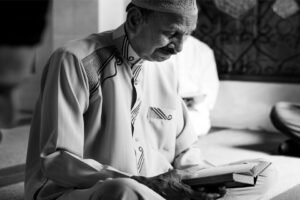 In general, any and all good deeds are greatly rewarded during the blessed 10 days of Dhul Hajjah. We are promised that the reward of any good deeds during this time (during the first 10 days of Dhul Hijjah) is multi-fold as compared to any time during the rest of the year (and Allah knows best).
In general, any and all good deeds are greatly rewarded during the blessed 10 days of Dhul Hajjah. We are promised that the reward of any good deeds during this time (during the first 10 days of Dhul Hijjah) is multi-fold as compared to any time during the rest of the year (and Allah knows best).
This is especially true for the 9th of Dhul Hijjah, the Day of Arafat, of which it has been said: “There is no day on which Allah frees people from the Fire more so than on the day of Arafat.” (Muslim)
The good deeds referred to include (but are not limited to) acts such as prayer, reading and learning the Quran, making Dua (supplication), seeking Allah’s forgiveness (istighfar), tawbah (repentance to Allah), giving in charity and being good to our families, and other various voluntary (nafl) righteous deeds of worship and general beneficial actions for mankind and the world
There are, however, some specific good deeds as mentioned in the Quran and Sunnah that we are encouraged to partake of during these blessed 10 days, and they are as follows.
Hajj (pilgrimage)
The month of Dhul Hijjah is also known as “the month of the pilgrimage”. This is because it is only during this month that the traditional pilgrimage to Makkah and region is observed by Muslims from all the world, as they come together on the 8th, 9th and 10th of this month, performing and completing the fifth pillar of Islam, in the hope and desire that they will have all their previous sins forgiven upon the completion of this historic ritual.
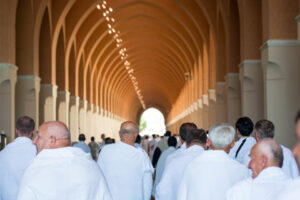 Performing or attending the Hajj is considered to be one of the best deeds that one can do during the first 10 days of Dhul Hijjah.
Performing or attending the Hajj is considered to be one of the best deeds that one can do during the first 10 days of Dhul Hijjah.
Prophet Mohammed (PBUH) was quoted to say, concerning the one who sincerely performs and completes the Hajj: “An accepted Hajj brings no less a reward than Paradise.” (Ibn Majah)
Fasting
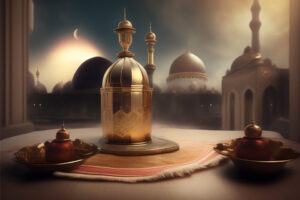 Fasting in the month of Dhul Hijjah is greating encouraged durng the first nine days. Of course, the day of the sacrifice, the day of Eid (the 10th), and the days following as well (11th, 12th &13th), these days are NOT for fasting – they are days in which fasting is essentially prohibited for all.
Fasting in the month of Dhul Hijjah is greating encouraged durng the first nine days. Of course, the day of the sacrifice, the day of Eid (the 10th), and the days following as well (11th, 12th &13th), these days are NOT for fasting – they are days in which fasting is essentially prohibited for all.
The option or choice of fasting as a means of worship during th first nine days is particularly stressed for the Day of Arafat, as the Prophet Mohammed (PBUH) said: “Fasting the Day of Arafat expiates the (minor) sins of two years.” (Muslim) NOTE: this is understood to mean the expiation is for the past year and the coming year.
Dhikr (Remembrance of Allah)
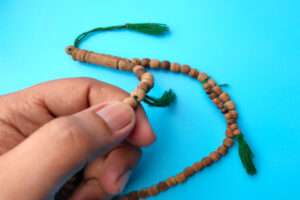 Dhikr is the verbal remembrance of Allah (SWT), and it is another and important act of worship particularly beloved to Allah, the reward of which is multiplied during these first 10 days of Dhul-Hijjah.
Dhikr is the verbal remembrance of Allah (SWT), and it is another and important act of worship particularly beloved to Allah, the reward of which is multiplied during these first 10 days of Dhul-Hijjah.
It is stated in the Quran: “And mention the name of Allah on the appointed days” (Al-Hajj 12:28)
The “appointed days” is in reference specifically to these first 9 and 10 days of Dhul Hijjah
Prophet Mohammed (PBUH) also encouraged Muslims to recite a lot of Tasbeeh ( SubhanAllah), Tahmeed (Alhamdulillah) and Takbeer (Allahu-Akbar) during this time.
He (PBUH) said: “There are no days that are greater before Allah in which Good Deeds are more beloved to Him, than these ten days, so recite a great deal of tahleel, takbeer, and tahmeed during them.” (Ahmad)
Sacrifice
 The 10th day of Dhul-Hijjah is Eid al-Adha, the day in which we perform and observe the sacrifice. This ritual of Eid al-Adha commemorates the devotion of Prophet Ibrahim (AS) to Allah (SWT). Ibrahim showed his devotion to Allah in that he was willing to sacrifice his son, Ismail (AS) for the sake of Allah (SWT). Ismail (AS) also demonstrated his devotion by his willingness to abide by whatever his father, Ibrahim (AS) found to be the correct choice. In response to their obedience to Allah (SWT), He intervened and provided a ram to be sacrificed by Ibrahim in Ismail’s place.
The 10th day of Dhul-Hijjah is Eid al-Adha, the day in which we perform and observe the sacrifice. This ritual of Eid al-Adha commemorates the devotion of Prophet Ibrahim (AS) to Allah (SWT). Ibrahim showed his devotion to Allah in that he was willing to sacrifice his son, Ismail (AS) for the sake of Allah (SWT). Ismail (AS) also demonstrated his devotion by his willingness to abide by whatever his father, Ibrahim (AS) found to be the correct choice. In response to their obedience to Allah (SWT), He intervened and provided a ram to be sacrificed by Ibrahim in Ismail’s place.
Therefore, the day of great sacrifice, Eid al-Adha, is the festival of sacrifice for Muslims worldwide. They will slaughter an animal – a goat, sheep, cow or camel – to reflect and demonstrate this great act of worship, and their own individual sense of obedience to Allah, and out of sincere thanks to Allah in His provisions and grand enveloping mercy.
Following the sacrifice, the meat is to be divided – at least one third of it should go to the poor and vulnerable. Traditionally, another third should be used to feed one’s (extended) family and neighbors, and the last third for the immediate family.
Some Muslims opt to not slaughter the animal for their own personal use, but rather to donate through systems of charity which deal with specification of the Qurban (Islamic Sacrificial services) programs worldwide, which will take the money from the donations, perform the slaughter of the chosen animals (for which there are strict specifications on what type of animal is acceptable for this), and then distribute the meat to those in need of it.
The Blessed 10 Days are Coming Soon
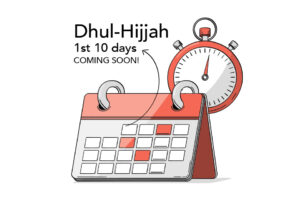
The blessed 10 days of Dhul Hijjah are coming soon – this year due to commence June 19, 2023. We should all prepare ourselves spiritually as well as physically to mark this time by greeting it with the joy and piety reflective of the season, and seek Allah’s forgiveness and blessings, as the opportunity for such great rewards from Allah (SWT) is time-sensitive.

